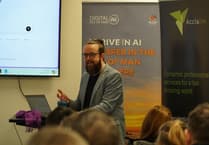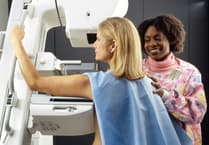For the last 12 years, The Sound Learning Centre has been invited to the island to help children and adults with various issues.
The organisation uses sensory therapy, including sound, light and neuro-developmental treatments to, ‘improve social, emotional, behavioural or academic performance’.
The treatment has been endorsed by learning disability charity Manx Mencap, which is once again organising a therapy programme from the visiting London-based centre this summer.
This week, Pauline Allen, a founder of the organisation, is performing assessments on its clients and will return in late July to conduct the therapy on the patients.
These formal assessments test all frequencies of sound and light and establish the individual’s thresholds.
Mrs Allen, who is qualified in the field of paediatric neuropsychology and a dyslexia therapist, has been delivering this treatment for 18 years and was trained by Dr Guy Bérard, a French ear, nose and throat (ENT) specialist.
One of the training methods pioneered by Dr Bérard is auditory integration training, which is the use of music and sound to address sensory problems, such as hearing distortions and hyperacusis (oversensitive hearing).
This training regime consists of two half-hour sessions a day for 10 days.
The centre also claims that this therapy can help with mental health issues such as ADHD, autism, clinical depression and anxiety.
These are said to cause discomfort and confusion in people with learning disabilities.
One case study I was shown was of a young girl who had hearing difficulties, issues with incontinence and low self-esteem.
She underwent the assessment, which showed that her hearing range was abnormal and the left and right ears were out of sync.
Following the training, the young girl said that ‘it was like she’d come out of a tunnel’ and now she was ‘clever and happy’.
The centre does not diagnose any issues that the client may have, nor is it an approved medical procedure.
On the organisation’s website, a medical disclaimer reads: ‘These are not medical interventions and we are not medically trained.
‘We do not claim to diagnose, treat, cure or prevent any disease, medical condition or any other physical or mental disorder and always recommend that clients consult their medical practitioners as appropriate and do their research before commencing any of our therapies.’
Mrs Allen said: ‘Nevertheless, we feel it’s much more important to look at the individual and their difficulties, rather than dealing with a label. We’re unique in that regard because most people are diagnosing or want to diagnose or have a diagnosis.
‘The diagnosis is not the person. It’s a conglomeration, if you like, of some of the underlying sensory issues.’
Other treatments offered by the centre include lightwave stimulation and neuro-developmental treatment.
Mrs Allen said: ‘The best thing about these therapies is that they are non-invasive, and not harmful.
‘Many children, even young children, even nonverbal children, can still feel bad about themselves and have low self-esteem.
‘Because they know they’re different inside, they know they’re different and just because a child doesn’t speak, it doesn’t mean to say they have nothing to say.
‘We see people whose self-esteem rises, we see people who have come out of depression, we see all children that come out of nappies, start speaking, start noticing and reading and are happier in themselves. We make no promises, and we give no guarantees, but after 29 years, if we didn’t see what we see, we wouldn’t do what we do.’
There have been numerous medical journals in the USA that have clarified their position on auditory integration training.
In 2000, Oliver Mumford, of the University of Auckland, New Zealand, penned an article for the American Journal of Mental Retardation, stating that the programme yielded ‘no behavioural benefits’ on children with autism.
He went on to state that ‘no individual child was identified as benefiting clinically or educationally from the treatment’.
Mrs Allen addressed some of the more common misconceptions about the therapy offered by the Sound Learning Centre.
She said: ‘People do not believe that listening to music, and looking at light, can have such a profound effect.
‘Now as far as the light is concerned, everyone knows we use light for sight, but we have a third set of receptors in our eyes, that take in light, but have nothing to do with sight.
‘It’s to do with all the biological functions, eating, sleeping, moods and even our libido is affected by the light that comes in through our eyes and goes to our brain.’
Mrs Allen is referring to the photosensitive ganglion cells, which can affect the hormones we produce in our bodies.
The third type of treatment that the organisation offers is neuro-developmental therapy, which helps young children to address some of the survival reflexes that we have when we are born, which usually subside into our subconscious over time, but in some cases linger for longer than they are supposed to.
Mrs Allen said: ‘I do an assessment which assesses how many of the primitive reflexes are still present, and whether the postural reflexes are absent, or not fully matured.
‘I give a set of exercises to do to help mature these reflexes, and I reassess them approximately four to six weeks later.
‘It can be done remotely by Zoom or one of the other methods if I’m not in the location where I’m doing the assessment and we get very good results.
‘All of these reflexes have an emotional component, so emotional maturity comes as well as physiological maturity.’
Having opened the Sound Learning Centre in 1995, Mrs Allen has travelled to countries such as Kuwait, Romania and Australia to give talks about sensory therapy and the treatment her organisation provides.
She started coming to the Isle of Man in 2009 and has been invited back by Manx Mencap every year since to conduct outreach programmes.
She said: ‘When I started coming to the island, I had parents bringing their children, and now I have grandparents bringing grandchildren, so word has certainly gotten around.’
The Sound Learning Centre’s delivery of the training will begin on July 24 and they will be in Centre 21, Douglas, for two weeks, leaving on August 6.




Comments
This article has no comments yet. Be the first to leave a comment.